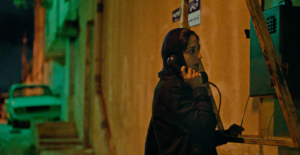Tatami
Premio Brian – Venise
2024

FR EN
Une finale médaillée d’exil ?
Cadre resserré, noir et blanc lumineux, tension dans l’air, un groupe de femmes en kimono et hijab rentre dans un dojo … c’est l’équipe féminine de judo iranienne venue participer aux championnats du monde organisés en Géorgie, et c’est l’histoire d’une judokate iranienne bien décidée à ramener une médaille à son pays alors qu’elle risque fort d’y rencontrer une judokate israélienne …
Présenté en septembre dernier à la Mostra de Venise, « Tatami » est le premier film co-réalisé par un Israélien Guy Nattiv (Golda), et une Iranienne Zar Amir Ebrahimi – l’actrice exilée qui a notamment remporté le Prix d’interprétation à Cannes en 2022 pour « Les Nuits de Mashhad ». Ecrit par l’actrice irano-française Elham Erfani, c’est un thriller sportif et une critique politique brûlante dans le sillage du mouvement ‘Femmes, Vie, Liberté’. C’est profondément un film de duel : aussi bien entre les diverses adversaires que la protagoniste rencontre sur le tatami, qu’entre elle et sa coach, deux femmes dont les réactions face aux décisions du régime iranien vont diverger – sans qu’elles ne jugent l’autre – et s’opposer, au gré des très belles prestations d’Arienne Mandi dans le rôle principal et de l’actrice et coréalisatrice dans celui de la coach.
De par le contexte des épreuves du championnat du monde, l’intrigue nous enferme dans une certaine unité de temps et de lieu renforçant la tension sportive et personnelle qui ne cesse de monter dans ce suspense quasiment en temps réel. C’est un film qui allie une beauté formelle à une puissance symbolique dans un magnifique cadre 4/3 en noir et blanc et un labyrinthe de couloirs dans la pénombre qui s’ouvre sur une scène où le tapis martial devient une arène de liberté. C’est aussi, plus simplement, un film sur le judo – comme en voit peu – avec de vrais athlètes sur le tatami, et donc aussi bien un film de combat sportif que politique. C’est une œuvre singulière, très bien réalisée et au message important et nécessaire, avec de très bons choix narratifs mais aussi quelques ficelles peut-être légèrement trop manichéennes au départ ?
A medal-winning final for exile?
Tightly framed, radiant black and white, tension in the air, as a group of women in kimonos and hijabs enter a dojo… this is the Iranian women’s judo team at the world championships in Georgia, and this is the story of an Iranian judoka eager to bring home a medal despite the risk of running into an Israeli opponent…
First screened last September at the Venice Film Festival, “Tatami” is the first film co-directed by an Israeli writer Guy Nattiv (Golda), and an Iranian woman Zar Amir Ebrahimi – the exiled actress who won the Best Actress Award at Cannes in 2022 for “Holy Spider”. Written by Iranian-French actress Elham Erfani, this is a sports thriller and a burning political indictment in the wake of the ‘Woman, Life, Freedom’ movement. This is fundamentally a film about duels: both between the various opponents the protagonist faces on the tatami, and between her and her coach, two women whose reactions to the decisions of the Iranian regime will be at odds – without judging each other – and will clash, thanks to the great performances of Arienne Mandi in the lead role and the actress and co-director as her coach.
Set in the context of the world championship rounds, the plot draws us into a certain unity of time and place, reinforcing the sporting and personal tension that never ceases to rise in this almost real-time thriller. This is a film that combines technical elegance with symbolic power, in a splendid 4:3 black-and-white frame and a maze of corridors in half-light that opens onto a scene where the martial mat becomes the arena for freedom. It’s also, quite simply, a film about judo – the likes of which you don’t see often – with real athletes on the tatami, and therefore as much a sports combat film as a political one. It’s a singular movie, beautifully made, with an important and necessary message, and some very good storytelling choices, but also perhaps a few overly simplistic bits right from the start?

